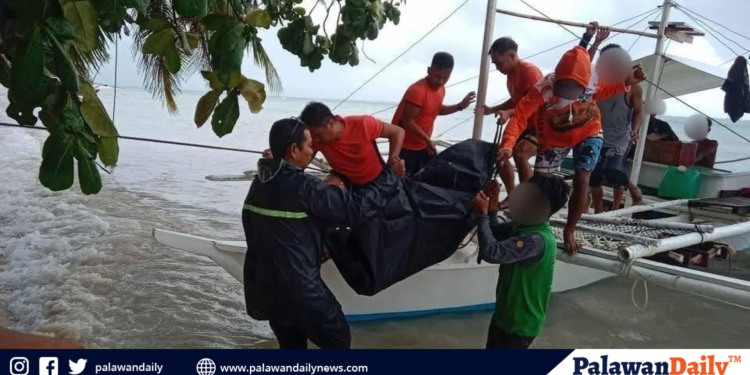A small motorized vessel bound for Malaysia capsized off the southern waters of Palawan on Sunday, June 8, leaving one dead, six rescued, and four others still missing as of this writing, according to the Philippine Coast Guard.
The boat, identified as a kumpit, was navigating the waters off Balabac when it suffered an engine failure and was overcome by rough seas and bad weather conditions. The passengers—hailing from various parts of Luzon and the Visayas—were reportedly en route to Malaysia when disaster struck.
The Coast Guard Station Balabac confirmed that it received a report early Sunday morning from a local fisherman, prompting an immediate response. Rescued individuals came from Las Piñas, Olongapo, Balintawak, Mandaue, and Cebu. One fatality, identified as Jelyn Amparna from Cavite, was recovered lifeless.
“Base sa ulat ng mga survivors, nakaranas umano sila ng engine failure na sinabayan pa ng masamang panahon,” said Coast Guard Acting Station Commander Ens. Mark Joseph Bajao.
In a statement, Bajao said the incident is also being investigated as a possible case of human trafficking, given Balabac’s growing reputation as a “backdoor” maritime route used to smuggle Filipinos toward Malaysia without proper documentation.
The survivors were not residents of Palawan, and their collective point of departure has raised red flags among authorities who believe the group may have been recruited or smuggled from urban centers in Luzon and the Visayas.
Balabac, a remote cluster of islands close to the maritime boundary between the Philippines and Malaysia, has long been known for its ecological richness. But it is increasingly known in law enforcement circles for its geopolitical vulnerability—a remote exit point exploited by human trafficking syndicates.
The Philippine Coast Guard and anti-trafficking units have in recent years documented multiple attempts by recruiters to send Filipinos via unregulated vessels to Sabah. Victims are often promised domestic work or employment in construction and agriculture, with many unaware of the risks they face at sea or the legal peril awaiting them abroad.
In January 2025, six trafficking victims were intercepted at nearby Bancalaan Island. The victims, en route to Thailand via Malaysia, had been promised jobs through unverified recruiters.
In past years, victims have included minors and women, recruited via social media or personal networks.
Travelers using unregulated maritime routes face numerous hazards—from overloaded wooden vessels and unpredictable sea conditions to the ever-present risk of arrest or exploitation once abroad.
With limited radar coverage and scarce naval assets in southern Palawan, monitoring illicit crossings remains a logistical challenge. Coast Guard teams often rely on reports from local fishermen who chance upon signs of distress at sea.
Search and rescue operations for the four missing individuals have been temporarily suspended due to ongoing bad weather.
While the search continues, the tragedy brings renewed urgency to ongoing calls for a more proactive and sustained campaign against trafficking networks operating across Palawan’s maritime borders.
Law enforcement officials say that without increased investment in maritime surveillance, legal awareness campaigns, and local livelihood programs, communities in Balabac and nearby areas will remain vulnerable to recruitment and exploitation.
The Philippine Coast Guard said it will continue to coordinate with local officials and other agencies in the coming days to determine how the vessel departed, who was responsible for organizing the voyage, and whether the passengers had been deceived or coerced.
Back in Balabac, waves are expected to ease soon—allowing search teams to resume their work. But beyond the waters, officials acknowledge that a different kind of search must begin; one for accountability, protection, and long-term solutions.





















